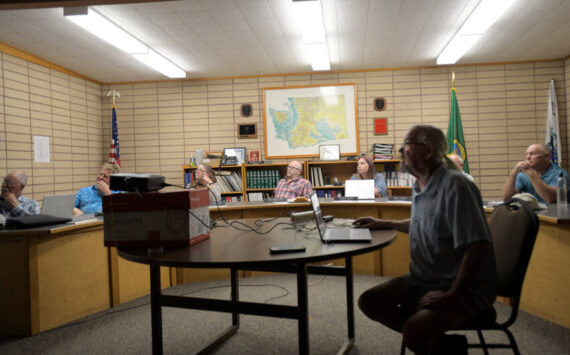Oroville PD offers school presence of police officer
OROVILLE – Approval of a new Oroville Critical Areas Ordinance was put of for at least two weeks as council reviews the ordinance in it’s current form.
The Tuesday, May 21 Oroville City Council meeting was advertised as a public hearing to take relevant testimony about the ordinance which was drafted by the Oroville Planning Commission, with the help of Chris Branch, director of Community Development.
Mayor Chuck Spieth asked if anyone in the audience was there to testify regarding the proposed ordinance and no one stepped forward.
“As you know the interim ordinance has been extended a number of times,” said Branch. “The Oroville Planning Commission held a hearing on March 21, 2012 which they extended to Aug. 15 and no one testified. The most significant change from the previous ordinance we always used is the wetlands provision.”
Branch said he found it a little troubling to go through regulations like the one proposed and not get any public input. He suggested the council review the ordinance for another two weeks before adopting it.
“I hope this hearing gains attention prior to adoption,” he said.
The mayor closed the hearing after again calling for testimony and Councilman Tony Koepke made a motion to postpone adoption until at least the next council meeting. The motion was seconded by Councilman Jon Neal and approved.
Moment of Silence
Before the hearing Mayor Spieth said he was going to break with the normal order of things and asked those present to join with him in a moment of silence in recognition of the devastation goingh on in Oklahoma.
“Sometimes we don’t realize how lucky we are to live in Okanogan County,” the mayor said after people took a moment to join in the mayor’s request.
Water Transfer
Under old business, Rod Noel, Superintendent of Public Works, updated the mayor and council on the issue of the water rights transfer from Puget Properties to the city.
“Basically a water rights permit was issued by the Department of Ecology to Puget Properties, AKA Veranda Beach, in 1986,” said Noel, explaining that the resort had transferred that right to the city when the city agreed to supply them water.
However, the city was unable to develop good enough wells on the resort property and Ecology said the water had to be drawn from that area, rather than on the other side of the lake, where the city has all its other wells. Ecology claimed they were different aquifers. Since then the city approached Ecology to see what could be done to supply water to the east side of the lake using its existing wells.
“Basically we are retiring the permit from Puget Properties in order for some quantity of water we have an application for on our Well Number 4 from 1986,” said Noel. “I think it looks good. I think we have a good chance to make it work.”
Noel explained that the city would be able to withdraw more water from Well Number 4 than is currently being withdrawn. However, the difference between that amount and that asked for in the application would not be decreased as the city hopes that the Water Rights application the city made to Ecology in 1986 will be approved.
“The Puget Properties water right was originally for up to 1000 gallons a minute. We will not give up the 2950 we have applied for,” said Noel.
He credited much of the success in the city’s hiring of a former DOE employee now working in the private sector to help the city find its way through the red tape to get the water rights transfer.
“I believe he’s done an excellent job on this… there’s no way we could have attempted this without his help,” said Mayor Spieth.
Noel said that Veranda Beach Resort has been contacted and they indicated that the city should proceed keeping the resorts interest in mind.
Veterans Memorial Park
The council heard that a cultural assessment may be required before the city can dig ditches to run electrical services in the camping area.
“We’d already anticipated expenses for a cultural resource survey in the campground when we planned on running electrical, but the estimate is pushing $20,000,” said Branch. “That price is giving us sticker shock… something will have to be done sooner or later though.”
Noel said that an area of cultural interest was located by the state when they still had the park and when they were putting in irrigation. He said the irrigation system needs to be updated whether they add additional electrical hook-ups or not.
“Technically if we come to the point we have to upgrade the irrigation system we will have to have an assessment then anyway,” said Noel.
Arnie Marchand, a member of the Colville Confederated Tribes said that the park was not much of a gathering place prior to white settlers coming into the area because it was mostly wetlands. He said so much has been in the park prior to it becoming a park, like bleachers for the county fair and band stands.
“There has been an awful lot going on there in the past 70 years,” said Marchand.
Branch said other studies of the area had been done in the past that indicated Native Americans made their camp up above.
“That makes more sense to camp there because the areas below were swamp. Much wasn’t used until there was fill put there,” he said.
“$20,000, come on this is Oroville, said Marchand, who suggested that representatives from Oroville meet with tribal representatives face to face.
School Safety Issue
“Ever since the shootings in Connecticut we have been getting more and more requests to spend more time at the school,” said Police Chief Clay Warnstaff. “Since I attended an FBI training I’ve come up with a simple idea I think could help.’
Warnstaff suggested that the city allow one of his officers to be based out of the high school and the school has agreed to supply a lockable office, phone line and computer work station.
“During the week I have an officer with me from 11 a.m to 3 p.m., he could be based out of the high school and still respond to calls. He would not be a school resource officer – his job would to be work for the city full time,” said Warnstaff, adding he would rotate in a new officer every three months.
“I think that would be an excellent program,” said Koepke.
“It sounds good, it will be good for the kids to see an officer’s presence,” added Councilman Walt Hart.
Oroville High School Principal Kristin Sarmiento said the school was excited about the plan.
“In the past we had Kevin Kinman with an office in the school,” said Sarmiento, referring to a local Okanogan County Deputy.
“The first level of law enforcement is an officer’s presence. I think it is a simple solution… I don’t know why I didn’t think of it sooner,” Warnstaff said.







